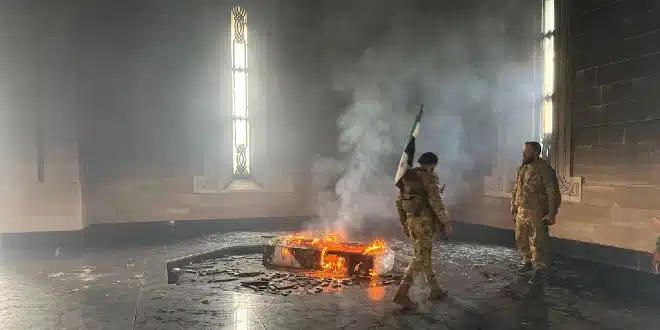The main leader of the rebels who overthrew Bashar al-Assad has declared that anyone involved in the torture or killing of detainees during Assad’s rule will be hunted down, and no pardons will be considered.
Abu Mohammad Al-Golani made this statement, which was published on the Syrian state TV’s Telegram channel, emphasizing the rebels’ intent to seek justice both within Syria and internationally by requesting the extradition of those who fled.
The world is closely observing whether Syria’s new leadership can stabilize the country after a 13-year civil war marked by sectarian and ethnic divisions. Under Assad’s rule, Syria was one of the most repressive police states in the Middle East.
Golani, whose former al-Qaeda affiliate Hayat Tahrir al-Sham (HTS) is now Syria’s most powerful force, must balance the demands for justice from victims with the need to prevent further violence and secure international aid.
The new interim prime minister aims to repatriate millions of Syrian refugees, foster unity, and provide essential services, although the task of rebuilding the country is immense.
The interim prime minister, Mohammed al-Bashir, highlighted the severe economic challenges, noting the near-worthlessness of the Syrian pound, with one US dollar equivalent to 35,000 Syrian pounds.
Rebuilding Syria is a monumental challenge after a civil war that resulted in hundreds of thousands of deaths, widespread destruction of cities, depopulated rural areas, and a devastated economy under international sanctions. Millions of refugees remain in camps after one of the largest displacements in modern history.
While US officials are cautiously engaging with the former rebels, HTS is still designated as a terrorist organization by the US, the United Nations, the EU, and other entities.
US Secretary of State Antony Blinken has stated that the new government must commit to respecting minority rights, facilitating humanitarian aid, and ensuring Syria is not used as a base for terrorism.
HTS has recently minimized its jihadist past, with hopes that this behavior might lead to easing wartime sanctions on Damascus and lifting terrorism bans on the rebels.
Two senior US congressmen have urged the suspension of some US sanctions, and the former rebels are in discussions with the US about potentially reducing these sanctions.
The new government has assured business leaders it will adopt a free-market approach and integrate into the global financial system after decades of state control, according to Bassel Hamwi, head of the Damascus Chambers of Commerce.
The world is watching closely to see if Syria’s new leaders can prevent revenge attacks after the civil war and decades of repression. In his first address on state TV, interim prime minister Bashir stood before two flags: one representing the opposition to Assad during the civil war and another with the Islamic oath of faith, typically used by Sunni Islamist fighters.
In Assad’s hometown of Qardaha, Sunni Islamist fighters reportedly torched the mausoleum of Assad’s father, Hafez, spreading fear among Alawite villagers who had pledged cooperation with the new rulers.
Russia, Assad’s ally and asylum provider, warned of the potential resurgence of Islamic State, which had established a violent mini-state in Syria and Iraq from 2014-2017.
The US is still determining its approach to the former rebels. State Department Spokesperson Matthew Miller emphasized the need for the new rulers to meet their promises of respecting minority and religious rights.
The rebels’ victory is a significant setback for Iran’s ‘Axis of Resistance,’ which includes armed groups like Lebanon’s Hezbollah, Iraq-based groups, Yemen’s Houthis, and Hamas. Iran’s Supreme Leader Ayatollah Ali Khamenei remained defiant, asserting that resistance grows stronger under pressure.
Following the rebels’ victory, Israel moved tanks across the border and conducted airstrikes to destroy Syrian army hardware to prevent it from falling into hostile hands.
UN Secretary-General Antonio Guterres expressed hope for Syria’s future after Assad’s overthrow, emphasizing the UN’s commitment to a smooth and inclusive transition of power in Syria.
Israel’s airstrikes targeted Syrian army bases, and the Israeli military claimed to have struck most of Syria’s strategic weapon stockpiles within 48 hours. Defense Minister Israel Katz stated Israel’s aim to create a “sterile defense zone” in southern Syria without a permanent troop presence.
Israel’s incursion, condemned by Turkey, Egypt, Qatar, and Saudi Arabia, adds a security challenge for the new administration, although Israel insists its intervention is temporary.
 The Daily Star Ireland
The Daily Star Ireland

